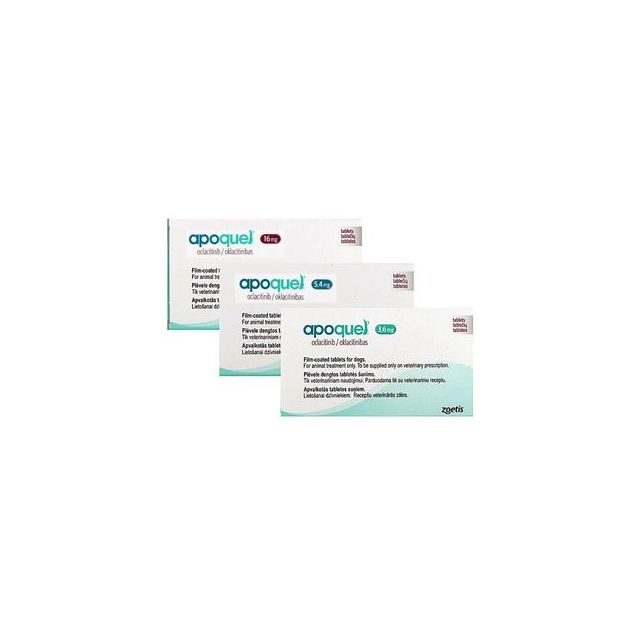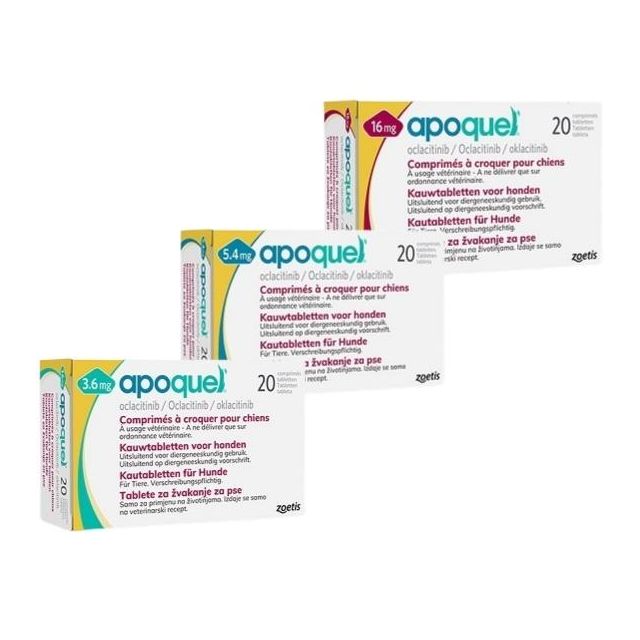Anti-inflammatories for dogs
A substantial portion of dogs that do not visit the veterinarian for preventive care (vaccination and deworming) have an inflammation. Inflammation is the body's response to 'things that, according to the body, do not belong,' such as bacteria, trauma, a splinter, or certain foods. Inflammations can occur throughout the entire body. The treatment of an inflammation naturally depends on the precise cause, but very often anti-inflammatory agents are used. Once the cause of the inflammation is determined, Pharmacy4pets is happy to assist in alleviating your dog's problems.
Inflammation in Dogs
Inflammation is a response of the body to a certain stimulus such as trauma, contact with an irritating substance, a bacterium, or a virus. Allergic reactions such as food hypersensitivity or atopy (allergy to environmental substances like grasses or dust mites) are also inflammations. An inflammatory response directed against the body's own tissues is called an autoimmune reaction.
Inflammation or Infection?
The words inflammation and infection are often used interchangeably. Inflammation can be accompanied by an infection with viruses, bacteria, yeast, or parasites (as often seen in ear infections and diarrhea), but it doesn't have to be. Conversely, in an infection, there is almost always inflammation: the body wants to ward off the intruders, and an inflammatory response occurs.
Symptoms of Inflammation
Inflammation has five characteristics: redness, swelling, pain, warmth, and loss of function. Depending on the location, cause, and severity of the inflammation, this can cause various symptoms. Sometimes inflammation barely causes any symptoms; for example, the swelling after a tick bite is a good example of this. On the other hand, in the case of inflammation of the pancreas, a dog can be very sick with severe abdominal pain, fever, and vomiting. Sometimes, the dog doesn't notice the inflammation itself, but symptoms occur because the inflammation severely damages an organ. This is seen, for example, in a sluggish thyroid or exocrine pancreatic insufficiency.
Treatment of Inflammation
Depending on the severity of the symptoms, inflammations are often treated with painkillers and/or anti-inflammatory agents. In addition, antibiotics are often used for concurrent infections, and of course, a specific treatment is applied targeting the organ system where the inflammation occurs and the symptoms the dog is experiencing. In some cases, for example, surgery (such as in the case of uterine inflammation) or blood transfusion (in the case of hemolytic anemia, where the body breaks down its own red blood cells) may be necessary.
Anti-Inflammatory Drugs
Anti-inflammatory drugs can suppress inflammation in various ways. All anti-inflammatory drugs can only be prescribed by a veterinarian after clinical examination.
NSAIDs: Killing Two Birds with One Stone
A commonly used anti-inflammatory drug is the NSAID, the non-steroidal anti-inflammatory drug. In everyday language, this medication is usually called a painkiller. Besides pain, an NSAID also effectively inhibits inflammation. Now, pain is an important symptom in many inflammations, so in essence, we're killing two birds with one stone. An NSAID can be administered via injection, in tablet form, or as a palatable liquid. NSAIDs are the first-choice treatment for inflammations of the musculoskeletal system, fever, injuries, and post-surgery.
Corticosteroids: A Double-Edged Sword?
Corticosteroids are medications that resemble the hormones produced by the adrenal cortex. Corticosteroids are still indispensable for certain conditions, but they are used much less nowadays. Fortunately, because in addition to their often very good effects on various inflammations, they have numerous side effects. They suppress inflammation so effectively that they also suppress the immune system. This is precisely the intention in autoimmune diseases and allergic reactions, but it can also greatly increase the risk of infections. That's why, for long-term relief of itching due to allergies, other medications are preferred nowadays. Prolonged use of corticosteroids can increase the risk of diabetes or lead to Cushing's syndrome. When corticosteroids are administered locally, such as in spray form for skin inflammations, in an eye or ear ointment, or via inhalation for asthmatic bronchitis, they have fewer side effects.
Specific Anti-Inflammatories for Allergic Dermatitis
In the past, corticosteroids were the only way to relieve severely itchy allergic skin problems in dogs. Nowadays, there are fortunately many more and safer options available. These drugs block certain signaling molecules involved in the development of inflammation and itching. They are available in tablet form and as a monthly injection.
Supportive Measures for Inflammation
In addition to using anti-inflammatory drugs, other measures can also be helpful. A nurturing and disinfecting spray like Maxani Cleanser Spray or Antisept desinfectiespray can help combat inflammation. The benefits of omega-3 fatty acids EPA and DHA in supporting various inflammatory processes have been extensively proven. These fatty acids are found in fish oil. Doils Skin, Megaderm, and Vetoquinol Care Omega 3-6 contain a high content of EPA and DHA. Honey is also commonly used for this purpose. Vetramil honey ointment can soothe and support the healing skin. For mild ear redness, Dermiel ear drops can help.
The bacteria in the gut play a very important role in the immune system. With probiotics like Purina Pro Plan Fortiflora, the dog's immunity can be supported. In the case of the common joint inflammation, osteoarthritis, managing or preventing obesity is also extremely important. Special dietary food like Sanimed Weight Reduction can help with that. Adjusting exercise and physiotherapy can also help make a dog with osteoarthritis move more smoothly. Flexadin Advanced and Iso-Joint +Acute are supplements to support healthy joints.
Pharmacy4pets is happy to assist your dog with inflammation with prescription medication, nurturing ointments, and supportive dietary supplements. If you have any questions about our products or about inflammation in your dog, please contact us.





